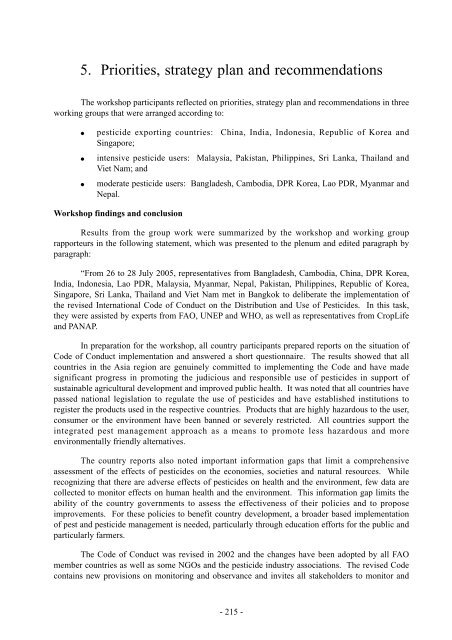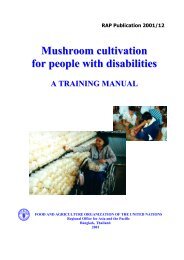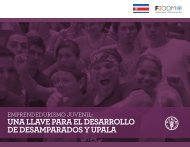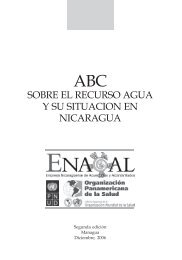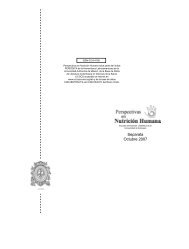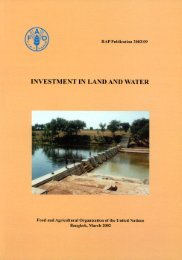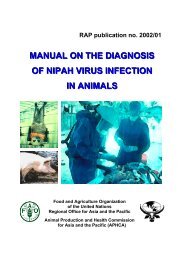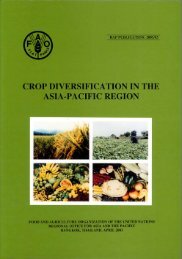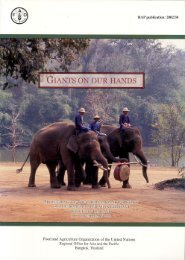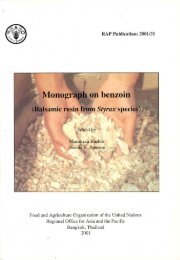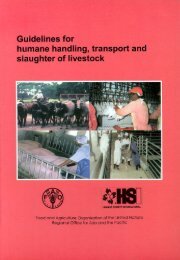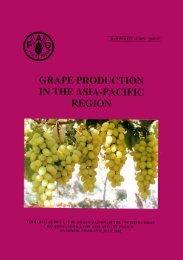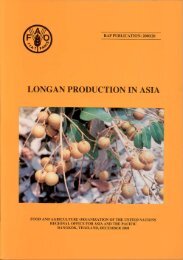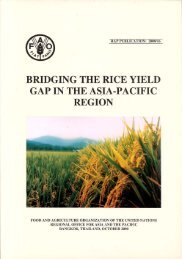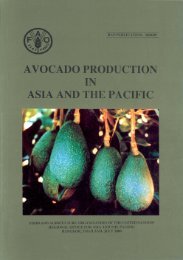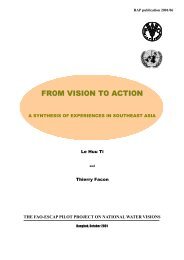Proceedings of the Asia regional workshop on the
Proceedings of the Asia regional workshop on the
Proceedings of the Asia regional workshop on the
You also want an ePaper? Increase the reach of your titles
YUMPU automatically turns print PDFs into web optimized ePapers that Google loves.
5. Priorities, strategy plan and recommendati<strong>on</strong>s<br />
The <str<strong>on</strong>g>workshop</str<strong>on</strong>g> participants reflected <strong>on</strong> priorities, strategy plan and recommendati<strong>on</strong>s in three<br />
working groups that were arranged according to:<br />
● pesticide exporting countries: China, India, Ind<strong>on</strong>esia, Republic <str<strong>on</strong>g>of</str<strong>on</strong>g> Korea and<br />
Singapore;<br />
● intensive pesticide users: Malaysia, Pakistan, Philippines, Sri Lanka, Thailand and<br />
Viet Nam; and<br />
● moderate pesticide users: Bangladesh, Cambodia, DPR Korea, Lao PDR, Myanmar and<br />
Nepal.<br />
Workshop findings and c<strong>on</strong>clusi<strong>on</strong><br />
Results from <str<strong>on</strong>g>the</str<strong>on</strong>g> group work were summarized by <str<strong>on</strong>g>the</str<strong>on</strong>g> <str<strong>on</strong>g>workshop</str<strong>on</strong>g> and working group<br />
rapporteurs in <str<strong>on</strong>g>the</str<strong>on</strong>g> following statement, which was presented to <str<strong>on</strong>g>the</str<strong>on</strong>g> plenum and edited paragraph by<br />
paragraph:<br />
“From 26 to 28 July 2005, representatives from Bangladesh, Cambodia, China, DPR Korea,<br />
India, Ind<strong>on</strong>esia, Lao PDR, Malaysia, Myanmar, Nepal, Pakistan, Philippines, Republic <str<strong>on</strong>g>of</str<strong>on</strong>g> Korea,<br />
Singapore, Sri Lanka, Thailand and Viet Nam met in Bangkok to deliberate <str<strong>on</strong>g>the</str<strong>on</strong>g> implementati<strong>on</strong> <str<strong>on</strong>g>of</str<strong>on</strong>g><br />
<str<strong>on</strong>g>the</str<strong>on</strong>g> revised Internati<strong>on</strong>al Code <str<strong>on</strong>g>of</str<strong>on</strong>g> C<strong>on</strong>duct <strong>on</strong> <str<strong>on</strong>g>the</str<strong>on</strong>g> Distributi<strong>on</strong> and Use <str<strong>on</strong>g>of</str<strong>on</strong>g> Pesticides. In this task,<br />
<str<strong>on</strong>g>the</str<strong>on</strong>g>y were assisted by experts from FAO, UNEP and WHO, as well as representatives from CropLife<br />
and PANAP.<br />
In preparati<strong>on</strong> for <str<strong>on</strong>g>the</str<strong>on</strong>g> <str<strong>on</strong>g>workshop</str<strong>on</strong>g>, all country participants prepared reports <strong>on</strong> <str<strong>on</strong>g>the</str<strong>on</strong>g> situati<strong>on</strong> <str<strong>on</strong>g>of</str<strong>on</strong>g><br />
Code <str<strong>on</strong>g>of</str<strong>on</strong>g> C<strong>on</strong>duct implementati<strong>on</strong> and answered a short questi<strong>on</strong>naire. The results showed that all<br />
countries in <str<strong>on</strong>g>the</str<strong>on</strong>g> <str<strong>on</strong>g>Asia</str<strong>on</strong>g> regi<strong>on</strong> are genuinely committed to implementing <str<strong>on</strong>g>the</str<strong>on</strong>g> Code and have made<br />
significant progress in promoting <str<strong>on</strong>g>the</str<strong>on</strong>g> judicious and resp<strong>on</strong>sible use <str<strong>on</strong>g>of</str<strong>on</strong>g> pesticides in support <str<strong>on</strong>g>of</str<strong>on</strong>g><br />
sustainable agricultural development and improved public health. It was noted that all countries have<br />
passed nati<strong>on</strong>al legislati<strong>on</strong> to regulate <str<strong>on</strong>g>the</str<strong>on</strong>g> use <str<strong>on</strong>g>of</str<strong>on</strong>g> pesticides and have established instituti<strong>on</strong>s to<br />
register <str<strong>on</strong>g>the</str<strong>on</strong>g> products used in <str<strong>on</strong>g>the</str<strong>on</strong>g> respective countries. Products that are highly hazardous to <str<strong>on</strong>g>the</str<strong>on</strong>g> user,<br />
c<strong>on</strong>sumer or <str<strong>on</strong>g>the</str<strong>on</strong>g> envir<strong>on</strong>ment have been banned or severely restricted. All countries support <str<strong>on</strong>g>the</str<strong>on</strong>g><br />
integrated pest management approach as a means to promote less hazardous and more<br />
envir<strong>on</strong>mentally friendly alternatives.<br />
The country reports also noted important informati<strong>on</strong> gaps that limit a comprehensive<br />
assessment <str<strong>on</strong>g>of</str<strong>on</strong>g> <str<strong>on</strong>g>the</str<strong>on</strong>g> effects <str<strong>on</strong>g>of</str<strong>on</strong>g> pesticides <strong>on</strong> <str<strong>on</strong>g>the</str<strong>on</strong>g> ec<strong>on</strong>omies, societies and natural resources. While<br />
recognizing that <str<strong>on</strong>g>the</str<strong>on</strong>g>re are adverse effects <str<strong>on</strong>g>of</str<strong>on</strong>g> pesticides <strong>on</strong> health and <str<strong>on</strong>g>the</str<strong>on</strong>g> envir<strong>on</strong>ment, few data are<br />
collected to m<strong>on</strong>itor effects <strong>on</strong> human health and <str<strong>on</strong>g>the</str<strong>on</strong>g> envir<strong>on</strong>ment. This informati<strong>on</strong> gap limits <str<strong>on</strong>g>the</str<strong>on</strong>g><br />
ability <str<strong>on</strong>g>of</str<strong>on</strong>g> <str<strong>on</strong>g>the</str<strong>on</strong>g> country governments to assess <str<strong>on</strong>g>the</str<strong>on</strong>g> effectiveness <str<strong>on</strong>g>of</str<strong>on</strong>g> <str<strong>on</strong>g>the</str<strong>on</strong>g>ir policies and to propose<br />
improvements. For <str<strong>on</strong>g>the</str<strong>on</strong>g>se policies to benefit country development, a broader based implementati<strong>on</strong><br />
<str<strong>on</strong>g>of</str<strong>on</strong>g> pest and pesticide management is needed, particularly through educati<strong>on</strong> efforts for <str<strong>on</strong>g>the</str<strong>on</strong>g> public and<br />
particularly farmers.<br />
The Code <str<strong>on</strong>g>of</str<strong>on</strong>g> C<strong>on</strong>duct was revised in 2002 and <str<strong>on</strong>g>the</str<strong>on</strong>g> changes have been adopted by all FAO<br />
member countries as well as some NGOs and <str<strong>on</strong>g>the</str<strong>on</strong>g> pesticide industry associati<strong>on</strong>s. The revised Code<br />
c<strong>on</strong>tains new provisi<strong>on</strong>s <strong>on</strong> m<strong>on</strong>itoring and observance and invites all stakeholders to m<strong>on</strong>itor and<br />
- 215 -


